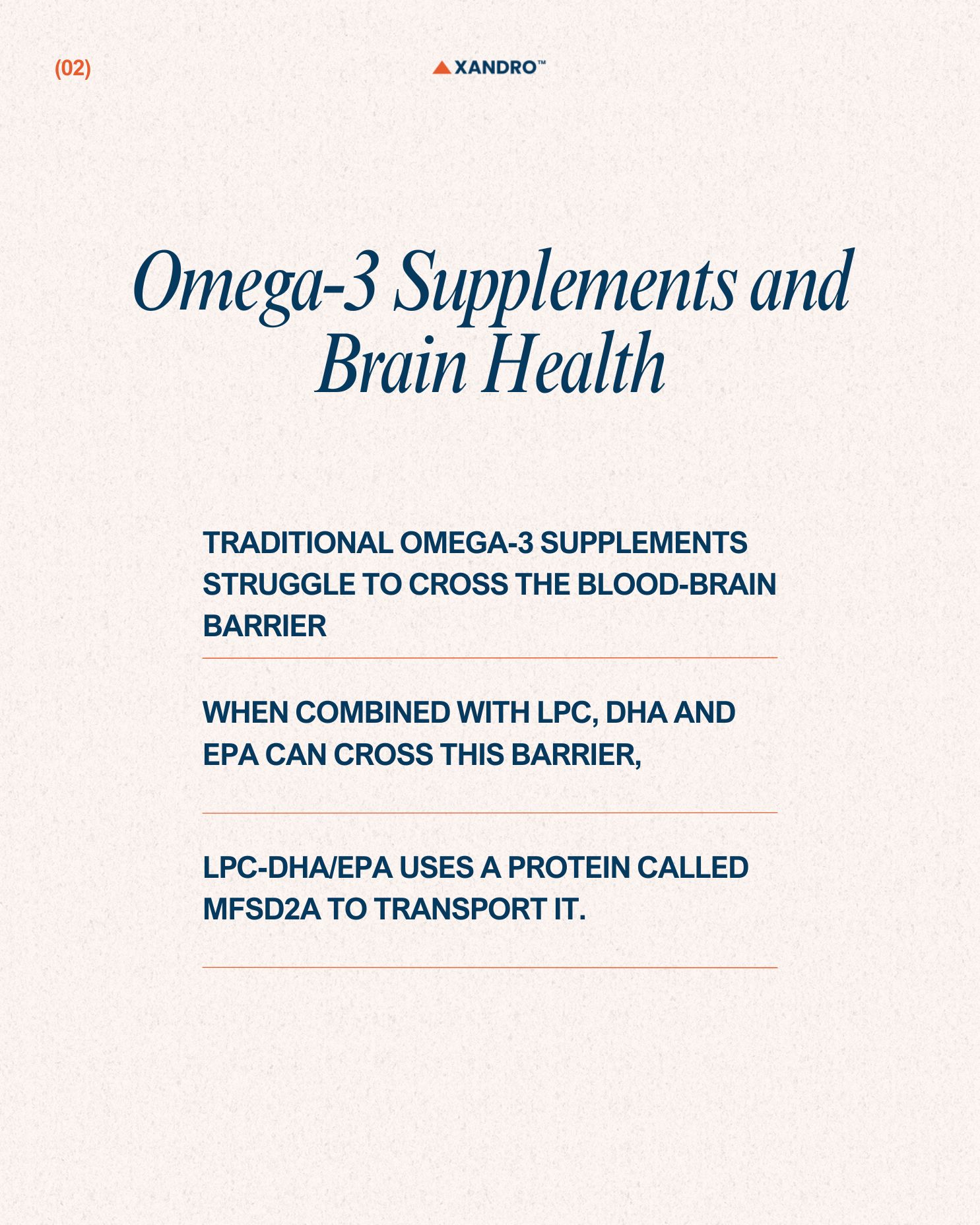Is Omega-3 Really Good for the Brain? Benefits & Who Should Avoid Fish Oil
10th Nov 2024
Are Omega-3 Supplements Really Useless for Brain Health?
Omega-3 fatty acids, specifically EPA and DHA, have long been touted as essential for brain health. They’re found naturally in fatty fish and are usually supplemented via fish oil. From early on, though, research has suggested that typical omega-3 supplements like fish oil may not be doing much for brain health, despite our brain needing omega-3 fatty acids, and it’s now been learned why.
Is Omega-3 Really Good for the Brain?
The question of, ‘Is omega-3 really necessary?’ has long been proved by scientists, with omega-3s especially crucial for the brain. DPA itself makes up 40 per cent of total fatty acids in the brain! Diets rich in omega-3s are linked to better brain function but they’re also needed for the development of the brain. Some studies have even linked omega-3 intake of pregnant women with higher childhood intelligence once the baby has grown. In older individuals, low levels of DHA are linked with a smaller brain size, which indicates faster brain ageing. They’ve even been linked with a lower risk of dementia.
What’s more, those with depression taking antidepressants who also took fish oil supplements with higher doses of EPA showed improvements in depressive symptoms.
The thing is, standard fish oil supplements don’t always show these benefits in studies, likely because only a small portion of regular omega-3s convert into the LPC form the brain can use easily, stopping omega-3 brain benefits in their tracks.
Further Reading: Supplements to Boost Focus and Concentration

The Limitations of Fish Oil Omega-3s
While EPA and DHA support cellular health and reduce inflammation, most fish oil supplements struggle to cross the blood-brain barrier, a protective filter that selectively allows certain substances into the brain. This barrier makes it difficult for traditional omega-3s to directly impact brain cells, limiting their effectiveness in enhancing memory or preventing cognitive decline.
Further Reading: All About Nootropics
Mixed Results in Research
Although some early studies hinted that omega-3s could improve brain health, more recent and rigorous research shows limited benefits. For instance, a study in people with Alzheimer’s disease found that omega-3 supplements did not significantly improve brain function. This is why it’s always been advised, and still is advised, that a nutritious diet, rich in whole foods and fatty fish, provides a more effective approach to brain health than supplements alone.
A New Discovery in Omega-3 Supplements
LPC-EPA/DHA is a new type of omega-3 that’s designed to be better absorbed by the brain. Unlike standard fish oil supplements, which carry omega-3s in forms that struggle to reach the brain, LPC-EPA/DHA binds omega-3s to a special molecule (LPC) that can cross into brain cells more effectively. This difference could make it particularly helpful for people at higher risk of Alzheimer’s, like those with the ApoE4 gene.
LPC-bound omega-3s use a special transport system in the body to cross the blood-brain barrier (a protective shield for the brain). This transport involves a protein called Mfsd2a, which allows LPC-EPA/DHA to enter brain cells more efficiently than standard omega-3s. Once inside, they help protect cell health, reduce inflammation and support cognitive function, as well as improve DHA and EPA levels in the brain.
Aker Biomarine recently introduced a new LPC-EPA/DHA supplement extracted from Antarctic krill called LYSOVETA™, which is now being used in some brain health supplements. It aims to improve brain absorption and potentially offer better benefits than traditional fish oil.

LPC Neuro: A New Omega-3 Supplement
Here at Xandro, we’ve created LPC Neuro, a nootropic brain health supplement that uses LYSOVETA™ to help bypass the limitations of traditional omega-3 supplements. LPC Neuro is designed to directly cross the blood-brain barrier, mimicking a naturally occurring lipid called LPC, which is essential for transporting omega-3s into the brain. By using the brain’s natural transport system, LPC Neuro aims to deliver these fatty acids more effectively, supporting brain cell health and potentially slowing age-related cognitive decline.
The protein Mfsd2a, found in the brain, is crucial for transporting omega-3s across the blood-brain barrier. LPC Neuro uses LPC lipids, which bind to Mfsd2a to deliver omega-3s directly into the brain, potentially making it a more promising choice for brain health. As we age, levels of this transporter protein decline, and supplementing with LPC Neuro could help maintain brain health as part of a balanced approach to cognitive well-being.
Further Reading: Resveratrol and Brian Function
End Note
While traditional omega-3 supplements like fish oil may offer cardiovascular benefits, they lack the ability to effectively support brain health. A diet rich in whole foods, exercise and potentially new supplements like LPC Neuro may be better options for those looking to support cognitive function as they age.
FAQs
Who should not take fish oil?
Avoid fish oil if you:
- Have fish, shellfish or soybean allergies
- Are pregnant, nursing or trying to conceive
- Are under 18 (unless advised by a doctor)
- Take blood thinners, birth control or other medications
- Have chronic health issues like diabetes, heart, kidney, liver or pancreas disorders
- Drink more than two alcoholic drinks daily (speak with your doctor first)
Fish oil may also worsen bipolar symptoms, increase bleeding risk in liver disease, lower immunity and cause gastrointestinal issues like nausea or diarrhea.
What does fish oil do?
Fish oil is rich in omega-3 fatty acids, which help support heart health, reduce inflammation and improve brain function. It may also help lower blood pressure and reduce the risk of certain heart diseases. Some people take it to support joint health or to improve mood, as it may have positive effects on mental well-being.
What are the benefits of taking fish oil?
Fish oil is packed with omega-3 fatty acids, which can help keep your heart healthy, reduce inflammation, support brain function and even improve mood. Some people take it to help with joint pain or to keep blood pressure in check.
What’s the difference between fish oil and omega-3?
Fish oil is a supplement that contains omega-3s, which are the main beneficial compounds in fish oil. Omega-3s are a type of fat found in fish oil, but you can also get them from other sources like flaxseed and chia seeds. So, fish oil is one source of omega-3, but not the only one!
